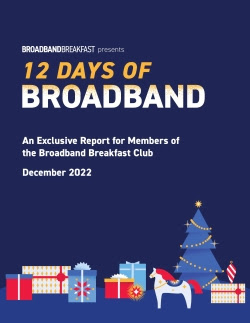Broadband Industry Grapples With High Inflation and Acute Workforce Shortage
Between supply chain disruptions and the rising price of goods, the increased costs of fiber deployment could be pushed onto consumers.
Teralyn Whipple

Inflation-driven high prices for materials, supply chain disruptions, and a shortage of workforce labor are putting significant economic pressures and delays on builders of fiber networks.
Inflation has gripped the United States for almost a year and a half. The latest consumer price index report has year-over-year inflation at 7.7 percent. Over the course of the year, the U.S. Bureau of Labor Statistics reported rates as high as 9.1 percent. The fiber industry is feeling the effects of inflation — even more so than other industries.
The 12 Days of Broadband 2022 (click to open)
- On the First Day of Broadband, my true love sent to me:
A Symmetrical Gigabit Network - On the Second Day of Broadband, my true love sent to me:
24 Reverse-Preemption Pole Attachment States (2022 edition) - On the Third Day of Broadband, my true love sent to me:
Section Two-30 of the Communications Decency Act - On the Fourth Day of Broadband, my true love sent to me:
$42.5 billion in Broadband Equity, Access and Deployment funds - On the Fifth Day of Broadband, my true love sent to me:
5 Federal Communications Commissioners - On the Sixth Day of Broadband, my true love sent to me:
Wi-Fi 6E - On the Seventh Day of Broadband, my true love sent to me:
7.7% annual inflation rate - On the Eighth Day of Broadband, my true love sent to me:
8,132,968 census blocks and a national Broadband Fabric - On the Ninth Day of Broadband, my true love sent to me:
$9 Billion Universal Service Fund - On the Tenth Day of Broadband, my true love sent to me:
$10 Billion Remaining in the Affordable Connectivity Program - On the Eleventh Day of Broadband, my true love sent to me:
11th Year of Xi Jinping’s rule in China - On the Twelfth Day of Broadband, my true love sent to me:
12 or More State Broadband Officers
Rising costs of goods are estimated to push costs of each new mile of fiber upward an additional $4,814, according to consulting firm Dgtl Infra in a July report. Government officials warned last summer that the increased cost of deployments could be pushed onto consumers.
Supply chain stressors following the pandemic are contributing to lead times of up to 60 weeks for materials necessary for fiber deployment and operation, per a recent white paper from the Fiber Broadband Association.

One effort to combat this has been from Sen. John Hickenlooper, D-Colo. He introduced the Network Equipment Transparency Act in February as a means of making the broadband supply chain problems more transparent. But the bill languished in the Senate, and will not likely make it through the lame duck Congress.
Furthermore, workforce shortages across the nation are threatening to place the American broadband industry in an “acute workforce shortage,” according to a WISPAPALOOZA panel in October.
Technical and worker shortages have been flagged by the agency and government officials, including Commerce Secretary Gina Raimondo, as a key area of concern for broadband builds.
The broadband industry is flush with federal funds — not the least of which comes from the Infrastructure Investment and Jobs Act’s allocations of $65 billion for broadband expenditures. A skilled workforce is required to make use of public dollars, deployment and adoption programs.
Panelists at a November Broadband Breakfast Live Online event argued that building long-term opportunities for career advancement is key to developing a sustainable broadband workforce.
One widely-touted effort is from the state of Ohio, which awarded $3 million to the Ohio State University to develop a state-wide curriculum for budding broadband and 5G workers. In June, the White House built on this thinking when it announced a challenge that encouraged employers to partner with training providers.










Member discussion